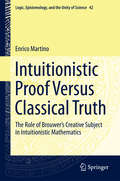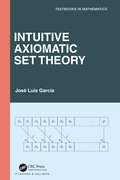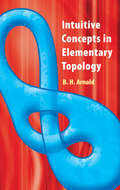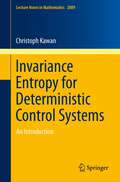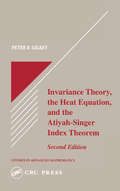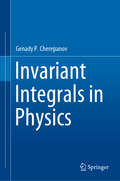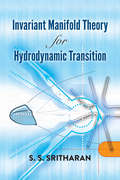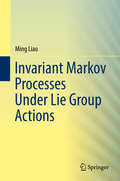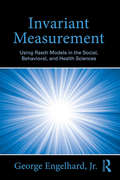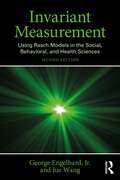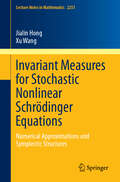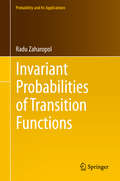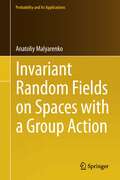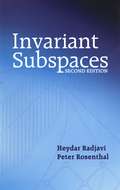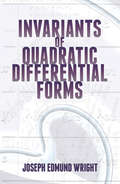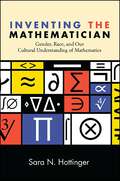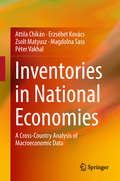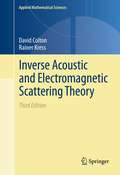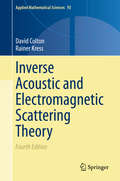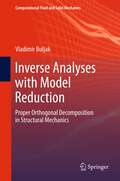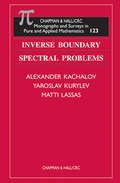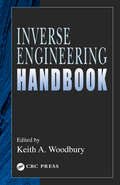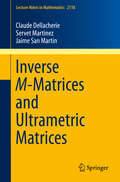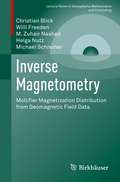- Table View
- List View
Intuitionistic Proof Versus Classical Truth: The Role Of Brouwer's Creative Subject In Intuitionistic Mathematics (Logic, Epistemology, and the Unity of Science #42)
by Enrico MartinoThis book examines the role of acts of choice in classical and intuitionistic mathematics. Featuring fifteen papers – both new and previously published – it offers a fresh analysis of concepts developed by the mathematician and philosopher L.E.J. Brouwer, the founder of intuitionism.The author explores Brouwer’s idealization of the creative subject as the basis for intuitionistic truth, and in the process he also discusses an important, related question: to what extent does the intuitionistic perspective succeed in avoiding the classical realistic notion of truth? The papers detail realistic aspects in the idealization of the creative subject and investigate the hidden role of choice even in classical logic and mathematics, covering such topics as bar theorem, type theory, inductive evidence, Beth models, fallible models, and more. In addition, the author offers a critical analysis of the response of key mathematicians and philosophers to Brouwer’s work. These figures include Michael Dummett, Saul Kripke, Per Martin-Löf, and Arend Heyting.This book appeals to researchers and graduate students with an interest in philosophy of mathematics, linguistics, and mathematics.
Intuitive Axiomatic Set Theory (Textbooks in Mathematics)
by José L GarciáSet theory can be rigorously and profitably studied through an intuitive approach, thus independently of formal logic. Nearly every branch of Mathematics depends upon set theory, and thus, knowledge of set theory is of interest to every mathematician. This book is addressed to all mathematicians and tries to convince them that this intuitive approach to axiomatic set theory is not only possible but also valuable.The book has two parts. The first one presents, from the sole intuition of "collection" and "object", the axiomatic ZFC-theory. Then, we present the basics of the theory: the axioms, well-orderings, ordinals and cardinals are the main subjects of this part. In all, one could say that we give some standard interpretation of set theory, but this standard interpretation results in a multiplicity of universes. The second part of the book deals with the independence proofs of the continuum hypothesis (CH) and the axiom of choice (AC), and forcing is introduced as a necessary tool, and again the theory is developed intuitively, without the use of formal logic. The independence results belong to the metatheory, as they refer to things that cannot be proved, but the greater part of the arguments leading to the independence results, including forcing, are purely set-theoretic. The book is self-contained and accessible to beginners in set theory. There are no prerequisites other than some knowledge of elementary mathematics. Full detailed proofs are given for all the results.
Intuitive Concepts in Elementary Topology
by B. H. ArnoldClassroom-tested and much-cited, this concise text offers a valuable and instructive introduction for undergraduates to the basic concepts of topology. It takes an intuitive rather than an axiomatic viewpoint, and can serve as a supplement as well as a primary text.A few selected topics allow students to acquire a feeling for the types of results and the methods of proof in mathematics, including mathematical induction. Subsequent problems deal with networks and maps, provide practice in recognizing topological equivalence of figures, examine a proof of the Jordan curve theorem for the special case of a polygon, and introduce set theory. The concluding chapters examine transformations, connectedness, compactness, and completeness. The text is well illustrated with figures and diagrams.
Invariance Entropy for Deterministic Control Systems
by Christoph KawanThis monograph provides an introduction to the concept of invariance entropy, the central motivation of which lies in the need to deal with communication constraints in networked control systems. For the simplest possible network topology, consisting of one controller and one dynamical system connected by a digital channel, invariance entropy provides a measure for the smallest data rate above which it is possible to render a given subset of the state space invariant by means of a symbolic coder-controller pair. This concept is essentially equivalent to the notion of topological feedback entropy introduced by Nair, Evans, Mareels and Moran (Topological feedback entropy and nonlinear stabilization. IEEE Trans. Automat. Control 49 (2004), 1585-1597). The book presents the foundations of a theory which aims at finding expressions for invariance entropy in terms of dynamical quantities such as Lyapunov exponents. While both discrete-time and continuous-time systems are treated, the emphasis lies on systems given by differential equations.
Invariance Theory: The Heat Equation and the Atiyah-Singer Index Theorem (Studies in Advanced Mathematics #16)
by Peter B. GilkeyThis book treats the Atiyah-Singer index theorem using the heat equation, which gives a local formula for the index of any elliptic complex. Heat equation methods are also used to discuss Lefschetz fixed point formulas, the Gauss-Bonnet theorem for a manifold with smooth boundary, and the geometrical theorem for a manifold with smooth boundary. The author uses invariance theory to identify the integrand of the index theorem for classical elliptic complexes with the invariants of the heat equation.
Invariance of Modules under Automorphisms of their Envelopes and Covers (London Mathematical Society Lecture Note Series #466)
by Askar Tuganbaev Ashish K. Srivastava Pedro A. Guil AsensioThe theory of invariance of modules under automorphisms of their envelopes and covers has opened up a whole new direction in the study of module theory. It offers a new perspective on generalizations of injective, pure-injective and flat-cotorsion modules beyond relaxing conditions on liftings of homomorphisms. This has set off a flurry of work in the area, with hundreds of papers using the theory appearing in the last decade. This book gives the first unified treatment of the topic. The authors are real experts in the area, having played a major part in the breakthrough of this new theory and its subsequent applications. The first chapter introduces the basics of ring and module theory needed for the following sections, making it self-contained and suitable for graduate students. The authors go on to develop and explain their tools, enabling researchers to employ them, extend and simplify known results in the literature and to solve longstanding problems in module theory, many of which are discussed at the end of the book.
Invariant Integrals in Physics
by Genady P. CherepanovIn this book, all physical laws are derived from a small number of invariant integrals which express the conservation of energy, mass, or momentum. This new approach allows us to unify the laws of theoretical physics, to simplify their derivation, and to discover some novel or more universal laws. Newton's Law of gravity is generalized to take into account cosmic forces of repulsion, Archimedes' principle of buoyancy is modified for account of the surface tension, and Coulomb's Laws for rolling friction and for the interaction of electric charges are substantially repaired and generalized. For postgraduate students, lecturers and researchers.
Invariant Manifold Theory for Hydrodynamic Transition (Dover Books on Mathematics)
by S. S. SritharanInvariant manifold theory serves as a link between dynamical systems theory and turbulence phenomena. This volume consists of research notes by author S. S. Sritharan that develop a theory for the Navier-Stokes equations in bounded and certain unbounded geometries. The main results include spectral theorems and analyticity theorems for semigroups and invariant manifolds."This monograph contains a lot of useful information, including much that cannot be found in the standard texts on the Navier-Stokes equations," observed MathSciNet, adding "the book is well worth the reader's attention." The treatment is suitable for researchers and graduate students in the areas of chaos and turbulence theory, hydrodynamic stability, dynamical systems, partial differential equations, and control theory. Topics include the governing equations and the functional framework, the linearized operator and its spectral properties, the monodromy operator and its properties, the nonlinear hydrodynamic semigroup, invariant cone theorem, and invariant manifold theorem. Two helpful appendixes conclude the text.
Invariant Markov Processes Under Lie Group Actions
by Ming LiaoThe purpose of this monograph is to provide a theory of Markov processes that are invariant under the actions of Lie groups, focusing on ways to represent such processes in the spirit of the classical Lévy-Khinchin representation. It interweaves probability theory, topology, and global analysis on manifolds to present the most recent results in a developing area of stochastic analysis. The author’s discussion is structured with three different levels of generality:— A Markov process in a Lie group G that is invariant under the left (or right) translations— A Markov process xt in a manifold X that is invariant under the transitive action of a Lie group G on X— A Markov process xt invariant under the non-transitive action of a Lie group GA large portion of the text is devoted to the representation of inhomogeneous Lévy processes in Lie groups and homogeneous spaces by a time dependent triple through a martingale property. Preliminary definitions and results in both stochastics and Lie groups are provided in a series of appendices, making the book accessible to those who may be non-specialists in either of these areas.Invariant Markov Processes Under Lie Group Actions will be of interest to researchers in stochastic analysis and probability theory, and will also appeal to experts in Lie groups, differential geometry, and related topics interested in applications of their own subjects.
Invariant Measurement: Using Rasch Models in the Social, Behavioral, and Health Sciences
by George Engelhard Jr.This introductory text describes the principles of invariant measurement, how invariant measurement can be achieved with Rasch models, and how to use invariant measurement to solve measurement problems in the social, behavioral, and health sciences. Rasch models are used throughout but a comparison of Rasch models to other item response theory (IRT) models is also provided. Written with students in mind, the manuscript was class tested to help maximize accessibility. Chapters open with an introduction and close with a summary and discussion. Numerous examples and exercises demonstrate the main issues addressed in each chapter. Key terms are defined when first introduced and in an end-of-text glossary. All of the book’s analyses were conducted with the Facets program. The data sets used in the book, sample syntax files for running the Facets program, Excel files for creating item and person response functions, links to related websites, and other material are available at www.GeorgeEngelhard.com. Highlights include: A strong philosophical and methodological approach to measurement in the human sciences Demonstrations of how measurement problems can be addressed using invariant measurement Practical illustrations of how to create and evaluate scales using invariant measurement A history of measurement based on test-score and scaling traditions Previously unpublished work in analyzing rating data, the detection and measurement of rater errors, and the evaluation of rater accuracy A review of estimation methods, model-data fit, indices used to evaluate the quality of rater-mediated assessments, rater error and bias, and rater accuracy. Intended as a supplementary text for graduate or advanced undergraduate courses on measurement or test theory, item response theory, scaling theory, psychometrics, advanced measurement techniques, research methods, or evaluation research taught in education, psychology, and the social and health sciences, the book also appeals to practitioners and researchers in these fields who develop or use scales and instruments. Only a basic mathematical level is required including a basic course in statistic.
Invariant Measurement: Using Rasch Models in the Social, Behavioral, and Health Sciences
by George Engelhard, Jr. Jue WangThis is the second edition of an introductory text that describes the principles of invariant measurement; how invariant measurement can be achieved using Rasch measurement theory; and how to use invariant measurement to solve a variety of measurement problems in the social, behavioral, and health sciences. Rasch models are used throughout the text, but brief comparisons of Rasch models to other item response theory (IRT) models are also provided.Written with students in mind, this new edition was class-tested to help maximize accessibility. Chapters open with an introduction and close with a discussion and summary. All chapters have been updated from the first edition, and a new chapter on explanatory Rasch models has been added. Features include numerous examples and exercises to demonstrate the main issues addressed in each chapter. Key terms are defined when first introduced and included in a helpful end-of-text glossary.This book also benefits from online materials which include the data sets used in the book, sample syntax files for running the Facets program, Excel files for creating item and person response functions, and links to related websites.This book will act as a supplementary text for graduate or advanced undergraduate courses on measurement or test theory, IRT, scaling theory, psychometrics, advanced measurement techniques, research methods, or evaluation research taught in education, psychology, and other social and health sciences. It will also appeal to practitioners and researchers in these fields who develop or use scales and instruments. Only a basic mathematical level is required, including a basic course in statistics, ensuring it is an accessible resource for students and researchers alike.
Invariant Measures for Stochastic Nonlinear Schrödinger Equations: Numerical Approximations and Symplectic Structures (Lecture Notes in Mathematics #2251)
by Xu Wang Jialin HongThis book provides some recent advance in the study of stochastic nonlinear Schrödinger equations and their numerical approximations, including the well-posedness, ergodicity, symplecticity and multi-symplecticity. It gives an accessible overview of the existence and uniqueness of invariant measures for stochastic differential equations, introduces geometric structures including symplecticity and (conformal) multi-symplecticity for nonlinear Schrödinger equations and their numerical approximations, and studies the properties and convergence errors of numerical methods for stochastic nonlinear Schrödinger equations.This book will appeal to researchers who are interested in numerical analysis, stochastic analysis, ergodic theory, partial differential equation theory, etc.
Invariant Probabilities of Transition Functions
by Radu ZaharopolThe structure of the set of all the invariant probabilities and the structure of various types of individual invariant probabilities of a transition function are two topics of significant interest in the theory of transition functions, and are studied in this book. The results obtained are useful in ergodic theory and the theory of dynamical systems, which, in turn, can be applied in various other areas (like number theory). They are illustrated using transition functions defined by flows, semiflows, and one-parameter convolution semigroups of probability measures. In this book, all results on transition probabilities that have been published by the author between 2004 and 2008 are extended to transition functions. The proofs of the results obtained are new. For transition functions that satisfy very general conditions the book describes an ergodic decomposition that provides relevant information on the structure of the corresponding set of invariant probabilities. Ergodic decomposition means a splitting of the state space, where the invariant ergodic probability measures play a significant role. Other topics covered include: characterizations of the supports of various types of invariant probability measures and the use of these to obtain criteria for unique ergodicity, and the proofs of two mean ergodic theorems for a certain type of transition functions. The book will be of interest to mathematicians working in ergodic theory, dynamical systems, or the theory of Markov processes. Biologists, physicists and economists interested in interacting particle systems and rigorous mathematics will also find this book a valuable resource. Parts of it are suitable for advanced graduate courses. Prerequisites are basic notions and results on functional analysis, general topology, measure theory, the Bochner integral and some of its applications.
Invariant Random Fields on Spaces with a Group Action
by Nicolai Leonenko Anatoliy MalyarenkoThe author describes the current state of the art in the theory of invariant random fields. This theory is based on several different areas of mathematics, including probability theory, differential geometry, harmonic analysis, and special functions. The present volume unifies many results scattered throughout the mathematical, physical, and engineering literature, as well as it introduces new results from this area first proved by the author. The book also presents many practical applications, in particular in such highly interesting areas as approximation theory, cosmology and earthquake engineering. It is intended for researchers and specialists working in the fields of stochastic processes, statistics, functional analysis, astronomy, and engineering.
Invariant Subspaces
by John A. Nohel Heydar RadjaviBroad survey focuses on operators on separable Hilbert spaces. Topics include normal operators, analytic functions of operators, shift operators, invariant subspace lattices, compact operators, invariant and hyperinvariant subspaces, von Neumann algebras, transitive operator algebras, and algebras associated with invariant subspaces. 1973 edition. New Appendix on Recent Developments.
Invariants of Quadratic Differential Forms (Dover Books on Mathematics)
by Joseph Edmund WrightThis classic monograph by a mathematician affiliated with Trinity College, Cambridge, offers a brief account of the invariant theory connected with a single quadratic differential form. Suitable for advanced undergraduates and graduate students of mathematics, it avoids unnecessary analysis and offers an accessible view of the field for readers unfamiliar with the subject.A historical overview is followed by considerations of the methods of Christoffel and Lie as well as Maschke's symbolic method and explorations of geometrical and dynamical methods. The final chapter on applications, which draws upon developments by Ricci and Levi-Civita, presents the most successful method and can be read independently of the rest of the book.
Inventing the Mathematician: Gender, Race, and Our Cultural Understanding of Mathematics
by Sara N. HottingerWhere and how do we, as a culture, get our ideas about mathematics and about who can engage with mathematical knowledge? Sara N. Hottinger uses a cultural studies approach to address how our ideas about mathematics shape our individual and cultural relationship to the field. She considers four locations in which representations of mathematics contribute to our cultural understanding of mathematics: mathematics textbooks, the history of mathematics, portraits of mathematicians, and the field of ethnomathematics. Hottinger examines how these discourses shape mathematical subjectivity by limiting the way some groups—including women and people of color—are able to see themselves as practitioners of math. Inventing the Mathematician provides a blueprint for how to engage in a deconstructive project, revealing the limited and problematic nature of the normative construction of mathematical subjectivity.
Inventories in National Economies: A Cross-country Analysis Of Macroeconomic Data
by Attila Chikán Erzsébet Kovács Zsolt Matyusz Magdolna Sass Péter VakhalThis book introduces a new approach in the field of macroeconomic inventory studies: the use of multivariate statistics to evaluate long-term characteristics of inventory investments in developed countries. By analyzing a 44-year period series of annual inventory change in percentage of GDP in a set of OECD countries, disclosing their relationship to growth, industry structure and alternative uses of GDP (fixed capital investments, foreign trade and consumption), it fills a gap in the economic literature. It is generally accepted that inventories play an important role in all levels of the economy. However, while there is extensive literature on micro- (and even item-) level inventory problems, macroeconomic inventory studies are scarce. Both the long-term processes of inventory formation and their correlation with other macroeconomic factors provide interesting conclusions about economic changes and policies in our immediate past, and present important insights for the future.
Inverse Acoustic and Electromagnetic Scattering Theory
by Rainer Kress David ColtonThe inverse scattering problem is central to many areas of science and technology such as radar and sonar, medical imaging, geophysical exploration and nondestructive testing. This book is devoted to the mathematical and numerical analysis of the inverse scattering problem for acoustic and electromagnetic waves. In this third edition, new sections have been added on the linear sampling and factorization methods for solving the inverse scattering problem as well as expanded treatments of iteration methods and uniqueness theorems for the inverse obstacle problem. These additions have in turn required an expanded presentation of both transmission eigenvalues and boundary integral equations in Sobolev spaces. As in the previous editions, emphasis has been given to simplicity over generality thus providing the reader with an accessible introduction to the field of inverse scattering theory. Review of earlier editions: "Colton and Kress have written a scholarly, state of the art account of their view of direct and inverse scattering. The book is a pleasure to read as a graduate text or to dip into at leisure. It suggests a number of open problems and will be a source of inspiration for many years to come." SIAM Review, September 1994 "This book should be on the desk of any researcher, any student, any teacher interested in scattering theory." Mathematical Intelligencer, June 1994
Inverse Acoustic and Electromagnetic Scattering Theory (Applied Mathematical Sciences #93)
by Rainer Kress David ColtonThe inverse scattering problem is central to many areas of science and technology such as radar, sonar, medical imaging, geophysical exploration and nondestructive testing. This book is devoted to the mathematical and numerical analysis of the inverse scattering problem for acoustic and electromagnetic waves. In this fourth edition, a number of significant additions have been made including a new chapter on transmission eigenvalues and a new section on the impedance boundary condition where particular attention has been made to the generalized impedance boundary condition and to nonlocal impedance boundary conditions. Brief discussions on the generalized linear sampling method, the method of recursive linearization, anisotropic media and the use of target signatures in inverse scattering theory have also been added.
Inverse Analyses with Model Reduction
by Vladimir BuljakIn this self-consistent monograph, the author gathers and describes different mathematical techniques and combines all together to form practical procedures for the inverse analyses. It puts together topics coming from mathematical programming, with soft computing and Proper Orthogonal Decomposition, in order to show, in the context of structural analyses, how the things work and what are the main problems one needs to tackle. Throughout the book a number of examples and exercises are worked out in order to make reader practically familiar with discussed topics.
Inverse Boundary Spectral Problems (Monographs and Surveys in Pure and Applied Mathematics)
by Alexander Kachalov Yaroslav Kurylev Matti LassasInverse boundary problems are a rapidly developing area of applied mathematics with applications throughout physics and the engineering sciences. However, the mathematical theory of inverse problems remains incomplete and needs further development to aid in the solution of many important practical problems.Inverse Boundary Spectral Problems
Inverse Engineering Handbook (Handbook Series for Mechanical Engineering)
by Keith A. WoodburyInverse problems have been the focus of a growing number of research efforts over the last 40 years-and rightly so. The ability to determine a "cause" from an observed "effect" is a powerful one. Researchers now have at their disposal a variety of techniques for solving inverse problems, techniques that go well beyond those useful for relatively si
Inverse M-Matrices and Ultrametric Matrices
by Claude Dellacherie Servet Martinez Jaime San MartinThe study of M-matrices, their inverses and discrete potential theory is now a well-established part of linear algebra and the theory of Markov chains. The main focus of this monograph is the so-called inverse M-matrix problem, which asks for a characterization of nonnegative matrices whose inverses are M-matrices. We present an answer in terms of discrete potential theory based on the Choquet-Deny Theorem. A distinguished subclass of inverse M-matrices is ultrametric matrices, which are important in applications such as taxonomy. Ultrametricity is revealed to be a relevant concept in linear algebra and discrete potential theory because of its relation with trees in graph theory and mean expected value matrices in probability theory. Remarkable properties of Hadamard functions and products for the class of inverse M-matrices are developed and probabilistic insights are provided throughout the monograph.
Inverse Magnetometry: Mollifier Magnetization Distribution from Geomagnetic Field Data (Lecture Notes in Geosystems Mathematics and Computing)
by Willi Freeden M. Zuhair Nashed Michael Schreiner Christian Blick Helga NutzThis monograph presents the geoscientific context arising in decorrelative geomagnetic exploration. First, an insight into the current state of research is given by reducing magnetometry to mathematically accessible, and thus calculable, decorrelated models. In this way, various questions and problems of magnetometry are made available to a broad scientific audience and the exploration industry. New stimuli are given, and innovative ways of modeling geologic strata by mollifier magnetometric techniques are shown.Potential data sets primarily of terrestrial origin constitute the main data basis in the book. For deep geology, the geomathematical decorrelation methods are designed in such a way that depth information (e.g., in boreholes) may be canonically entered. Overall, this book provides pioneering and ground-breaking innovative mathematical knowledge as a transfer methodology from the “reality space” of magnetometric measurements into the “virtual space” of mathematical-numerical modeling structures and mollifier solutions with novel geological application areas. It pursues a double goal: On the one hand, it represents a geoscientific set of rules for today's geoengineering, interested in the application of innovative modelling and simulation techniques to promising data sets and structures occurring in geomagnetics. On the other hand, the book serves as a collection of current material in Applied Mathematics to offer alternative methodologies in the theory of inverse problems.
